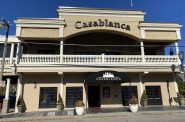Four Teammates And a Star Player
The Fine Arts Quartet played beautifully together and guest cellist Dominique de Williencourt played like a star.
The Fine Arts Quartet’s Summer Evenings of Music concert on Sunday night featured guest cellist Dominique de Williencourt in a very prominent way. De Williencourt performed his own composition, Etchmiadzine et le Mont Ararat, Op. 3, for solo cello, and this haunting work, meant as homage to the people of Armenia, was mesmerizing.
Williencourt tuned his cello strings in an abnormal regulation that allowed him to make interesting dissonances and drones above which he played fragments of mournful Armenian folk melodies, and in the upper register of his instrument, chilling ululations wailed. There were other creative sounds as well: simultaneous left-hand pizzicato and bouncing the bow on the strings for a tumbling percussive effect, chords fingered in the left hand while reaching the lowest string with his thumb for popping bass notes, and a ghostly muted section. Williencourt’s piece was ominous, soulful, and brilliantly played.
This was the middle work in a concert full of energy, pathos and charm, and played before a large audience. To begin the evening, FAQ violinists Ralph Evans and Efim Boico, violist Juan-Miguel Hernandez, and cellist Robert Cohen leaped into Haydn’s String Quartet in D major, Op. 50, No. 6, Hob. III:49, (“Frog”) with clear, light vitality.
Evans is a beautiful violinist. His tone is sweet and clear, and his agility through the demands of the lead violin voice is impeccable. As he defined the phrases in the Allegro spirituoso of Haydn’s sunny work, the inner voices responded with beautiful imitation and vigorous support. Cellist Cohen’s voice in the development was every bit as delightful as he made his instrument sing with warmth and drive.
The funny, delightful, dancing Menuetto: Allegretto strutted around the room with spunk, and the Finale: Allegro con spirito, while failing to give any true impression of a frog—the curious appellation with which this work was tagged—featured Evans hopping from one fanciful phrase to the next, and the others joining in with nary a croak among them.
The final work on the program was Schubert’s String Quintet in C major, Op. post. 163, D. 956, with Williencourt joined the FAQ for a vigorous reading of this impressive work. In his remarks from the stage, Cohen told us that BBC Radio has had a program since 1961 titled Desert Island Discs. The idea of the show is to ask famous people—actors, musicians, historians, politicians, philosophers, and other such disreputables—which eight recordings they couldn’t live without if stranded on a desert island. Cohen told us the Schubert quintet comes up more often than any other piece. Although my list would be absent this splendid work, it is easy to see why it has such popularity.
The Allegro ma non troppo first movement was just lovely. The sound of two cellos immediately filled the hall, and the warmth of Schubert’s charming melodies and harmonies captivated the audience. The Adagio was played with celestial beauty. The stunning exchanges between Evans and Cohen, as they passed melodies back and forth and played in octaves, were engaging and lyrical; the group’s pizzicato strumming of chords was perfection. Although the first part of the Scherzo: Presto–Trio: Andante sostenuto failed to hold my attention from an ambiguous delivery of the pulse, the Andante sostenuto was tenderly played, showing off the ensemble’s depth of musical imagination and style. The Viennese feel of the Allegretto was joyous, and Evans’s virtuosity was once again handsomely displayed.
Together, Evans and Boico are masterful, matching one another in a kind of musical twin-ship. Hernandez is a keenly sensitive contributor with a glorious sound and lightning in his hands, and Cohen’s playing is passionate and intelligent. Where the members of the FAQ swung like the oarsmen in a gold-medal rowing crew, however, the addition of Williencourt to the ensemble was less compelling than his solo effort. It was not from any musical weakness that his playing distracted me, but from pulling on his oar with a lack of unified rhythmic purpose.
I look forward to the final performance of the Summer Evenings of Music series on June 28, 7:30 p.m., at the Helene Zelazo Center for the Performing Arts. The program will feature guest clarinetist Michel Lethiec and music by Rossini, Mozart, and Del Tredici.
Review
-
Eating Burmese in Bay View
 Dec 13th, 2025 by Cari Taylor-Carlson
Dec 13th, 2025 by Cari Taylor-Carlson
-
Casablanca Is a Milwaukee Success
 Nov 30th, 2025 by Cari Taylor-Carlson
Nov 30th, 2025 by Cari Taylor-Carlson
-
Oh, Those Witty 18th Century Brits
 Nov 24th, 2025 by Dominique Paul Noth
Nov 24th, 2025 by Dominique Paul Noth





















